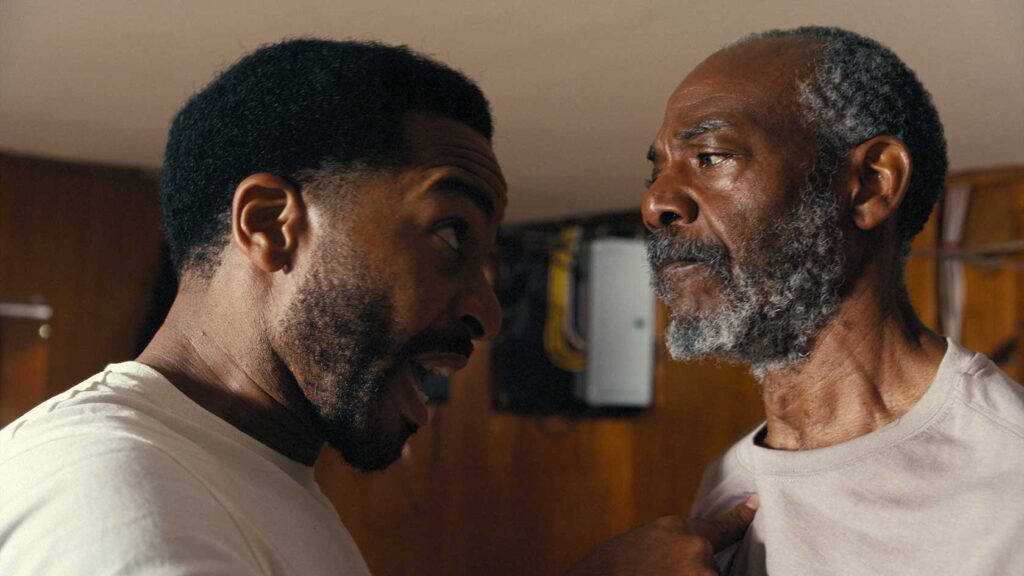Titus Kaphar’s ‘Exhibiting Forgiveness’ is a beautiful mediation on repair and reconciliation

Banner Arts & Culture Sponsored by Cruz Companies
Forgiveness can be complex. In some traditions, like the African American church, there is a belief that forgiving someone who harmed you is more for your benefit than theirs. Other traditions, like Judaism, posit forgiveness only comes after someone who harmed you verbally acknowledges the pain they caused. Meditations on forgiveness, harm and repair in father-son relationships are explored in artist Titus Kaphar’s directorial debut, “Exhibiting Forgiveness.”
The film is a thinly veiled fiction based on the estranged relationship between Kaphar and his father Jerome. In the film, Kaphar’s character is Tarrell (played by André Holland), an artist, husband and father who works out the trauma of his childhood on canvas. In the movie, the Jerome character is La’Ron (John Earl Jelks), who is seeking forgiveness and reconciliation after recovering from crack addiction. La’Ron has not seen or contacted his son in 15 years. Joyce (Aunjanue Ellis-Taylor) is Tarrell’s faithful and forgiving mother, and Aisha (Andra Day) is Tarrell’s beautiful and grounded wife.
Kaphar’s direction of this film creates a thought-provoking introspective reflection on forgiveness. The tug-of-war between enabling and forgiving is explored, as well as the effects of generational trauma from father to son. Kaphar comes from a lineage of ministers, and this religious influence is splattered throughout the story as characters discuss the Black church’s beliefs on reconciliation. For some, forgiveness is a source of comfort and faith. For others, it proves particularly harmful, especially when it comes to mending relationships that were damaged from the crack epidemic of the 1980s and ’90s. These ambivalent and oppositional thoughts are worked through on film and on canvas. Like anything with nuance and complexity, there are no definitive answers.
The story unfolds like a painting would. The underpainting lays the groundwork for the familial relationships: La’Ron’s decades-long cycle of addiction and abuse in between moments of trying to do the right thing through hard work. The first light layer of paint is represented by Tarrell’s strong maternal bond with Joyce and his thriving nuclear family, which includes Aisha and their young son. The shadows of the painting are marked by Tarrell’s memories of his childhood trauma that still cause night terrors well into adulthood. The final layer is the confrontation and conversation between father and son, all laid out on tape and eventually on canvas.
The film features 15 original artworks by Kaphar, including a portrait of his onscreen father La’Ron. The portrait is inspired by Kaphar’s series “The Jerome Project,” which began after Kaphar reunited with his father. He found his father’s mugshot, which was taken during their estrangement.
“The Jerome Project” laid the groundwork for “Exhibiting Forgiveness.” It consisted of paintings of mugshots of dozens of men who shared the same first and last names as his father. Portraits of incarcerated Black men are painted on a gold-leaf background in a style similar to Byzantine icon portraiture (think gilded icons of saints). These images are then partially covered in layers of thick tar representing how the stickiness and damage of the past never quite leaves when family members are isolated and incarcerated.
In Kaphar’s 2020 TED Talk, he said this about using art to have difficult conversations: “The things that must be said are not always lovely, but somehow if they’re reflective of truth, fundamentally that makes them beautiful.”
“Exhibiting Forgiveness” is now playing locally at AMC Boston Common 19 and AMC South Bay Center 12.







